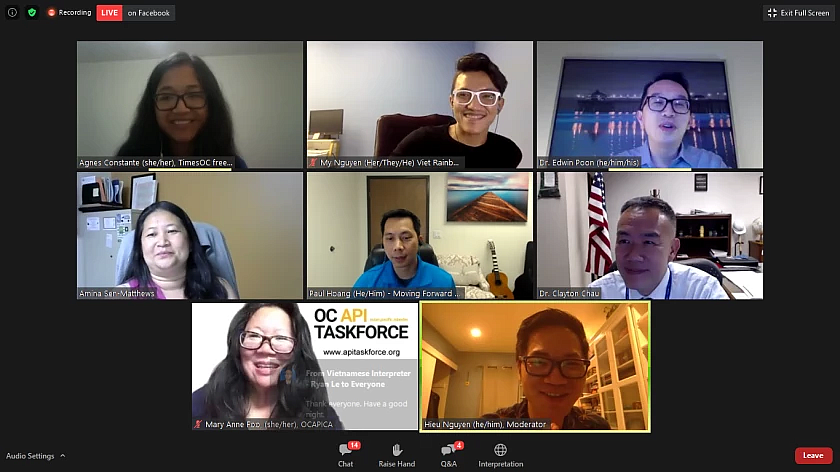Underserved communities crave more and better mental health conversations

Attendees at an online panel discussion on Asian American gender-based violence in May.
(Image by Danielle Fox/CHJ)
People are craving spaces to talk about the mental health challenges confronting their communities.
That point has repeatedly been driven home for me during the past year as I’ve reported on barriers to health care among Cambodian and Vietnamese Americans in Southern California. The resulting project, “Improving Health Care Access for Cambodians and Vietnamese,” was reported for the 2020 California Fellowship and published in TimesOC, a community newspaper of the Los Angeles Times.
During a community forum my editors and I organized to discuss this reporting, two of the panelists — including the director of the Orange County Health Care Agency — urged us to hold a second event where we could further explore how to improve mental health care in these communities. Ideas raised during the event included reaching out to isolated seniors who are unable to access resources due to health issues, and incorporating food — an important part of Asian American cultures — in outreach efforts.
With support from the Center for Health Journalism, my editor and I were able to build on that first forum and hold another one. We started by partnering with two organizations that were heavily involved in my reporting. With their input, we organized a panel discussion on Asian American gender-based violence in May, which is both Asian Pacific American Heritage Month and Mental Health Awareness Month. The topic was also timely given the rise of anti-Asian hate during the pandemic and the Atlanta shooting in March, where six of eight victims were Asian American women. The event was co-sponsored by the Los Angeles Times.
During my time as a California and data fellow at the Center, I've had the opportunity to organize several focus groups and panel discussions around mental health in Asian American communities. Every single time I’ve held these events, participants have expressed gratitude for a space to talk about an issue that is often stigmatized. People are greatly appreciative of the opportunity to talk with other community members about their experiences and struggles with mental health, and they are grateful that these experiences will be highlighted in media.
These events reinforced an observation I made while I was a California fellow and helping organize focus groups on mental health: People need these spaces. And these spaces are mutually beneficial for participants and journalists. As community members get the chance to talk about mental health, it offers a space for healing. And I've seen these events strengthen trust between myself and the communities I write about.
Some people who shared my reporting expressed gratitude that I took the time to listen to community members and incorporated the issues and experiences they elevated during focus sessions into my reporting.
The countless thanks I've received for holding focus groups and panels, along with the openness and eagerness with which community members have shared their experiences, have shown me how cathartic these events can be for participants.
The panel on gender-based violence, attended by about two dozen people, was no exception. Speakers talked about what gender-based violence looks like in Asian American communities, and how violence and structural oppression manifest in the body and psyche. They talked about how approximately two-thirds of anti-Asian hate crimes have been reported by women, and why community-driven solutions to crimes are more desirable than more policing. They also talked about the need for more mental health discussions (one panelist suggested having another event like this) that showcase multigenerational voices. And they called for more support for organizations on the ground working to alleviate the challenges various communities face.
It became clear that the media has a role in addressing these issues. Coverage of the Atlanta shooting, particularly earlier on, shone a spotlight on the shooter and the number of victims. Panelists asked: Where was earlier coverage on the impact their deaths had? Where were the stories on women who might have been fearful about going back to work at nail salons or spas after the shooting?
These events have opened doors to new ways of thinking about these issues and how media has been covering them. For instance, I hadn’t thought about stories on the fear other spa workers may have felt after the Atlanta shooting at all until one of the speakers brought that up during the panel.
Some of the things I've found helpful when planning panels and focus groups:
Identify groups to partner with who are working with the communities you're covering and who can shape the discussion. When my editor and I first began planning this event, we were thinking about centering it on mental health due to the rise of anti-Asian hate during the pandemic. We did talk about that, but ultimately shifted the focus to gender-based violence because our community partners agreed that it was a topic that needed to be discussed. They are the experts, so we listened to them.
Limit the number of questions moderators ask. Doing so allows conversations to flow more freely. I've co-facilitated some discussions where I've had four questions to structure the conversation, and those events have always felt rushed. For the panel on gender-based violence, we asked two questions that yielded a rich discussion: “What does gender-based violence look like in our communities?” and, “Now that we have a better understanding of what it looks like and what our communities are dealing with, what can we do about it? What would help?”
Another question I've come to ask in almost any conversations I have with community members is: What could media cover better about this issue or topic? Asking this has always elicited new perspectives and planted seeds for future stories.

